- Home
- Peter Orullian
Trial of Intentions
Trial of Intentions Read online
Begin Reading
Table of Contents
About the Author
Copyright Page
Thank you for buying this
Tom Doherty Associates ebook.
To receive special offers, bonus content,
and info on new releases and other great reads,
sign up for our newsletters.
Or visit us online at
us.macmillan.com/newslettersignup
For email updates on the author, click here.
The author and publisher have provided this e-book to you without Digital Rights Management software (DRM) applied so that you can enjoy reading it on your personal devices. This e-book is for your personal use only. You may not print or post this e-book, or make this e-book publicly available in any way. You may not copy, reproduce, or upload this e-book, other than to read it on one of your personal devices.
Copyright infringement is against the law. If you believe the copy of this e-book you are reading infringes on the author’s copyright, please notify the publisher at: us.macmillanusa.com/piracy.
To Mom and Dad.
Your example has meant everything.
ACKNOWLEDGMENTS
Something happened on the way to book two. Life, mostly. Upheavals at work. A change of editors. Loved ones passing. A friend taking his own life—more on that later. A writer (me) trying to persist. Trying not to become cynical. Trying to write the best book he could.
To whatever degree I succeeded at any of this, it’s owed in large part to others.
First, my wife, Cathy. In this book, there’s the notion of a glyph of power. A glyph that represents the pole-star, a fixed point in the heavens by which to navigate. It also represents the continuity of family. Cathy’s my pole-star. Also, she has the best laugh. Ever.
Next come my “little ones.” If I ever decide to get all “meta” about The Vault of Heaven, I’ll probably find that on some level having kids changed the resonances I both seek and feel in fiction. Also, you’re never too old for a tickle-fight.
My agent, Nat Sobel, is an extraordinary man. Beyond his superb agenting, he says the exact right thing I need to hear, and does it with an economy of language that’s really rather stunning. Also, he knows where to get the best New York bagels.
My editor, Claire Eddy. What a wonderful thing to find trust. Mine for Claire. Hers for me. I didn’t start this Vault of Heaven journey with Claire. But I damn sure hope to finish it with her. Also, she taught me the delightful phrase “And that doesn’t suck.”
I need to mention my beta-readers. Especially those who read the first draft of this book, which topped 450,000 words. Pretty sure there’s a sainthood in it for them. Also, collectively, they do the best snark.
Then there’s the army that is Tor. Folks like Bess Cozby, Patty Garcia, Leah Withers, Ardi Alspach, Irene Gallo, the Tor.com crew, the production team (I appreciate your patience), Phyllis Azar and the superb marketing department, and others I’ve likely forgotten. Thank you. Also, you guys rock!
A special thanks to the Tor sales team. I wasn’t in the room when some of the “meetings” took place, but my editor shared them with me. I’m deeply grateful to you for your support and enthusiasm and publishing acumen. Also, you’re flat damn creative.
Thanks, this time, too, to Tom Doherty. He graciously accepts my dinner invitations whenever I’m in New York. I learn something new every time. His support on this journey has meant a great deal. Also, the man has stories.
And a very special thanks to Linda Quinton. Linda has been a key decision-maker in how things have evolved for me. I have immense respect for her. And I’m grateful for the support she’s shown me and my writing. She also rocks!
Here, again, I’ll thank my parents. The most decent people I know. They taught me the ethics of hard work, doing what I say I will do, and fairness. They taught me sacrifice by sacrificing for me. Hopefully, I’ll be able to adequately express my gratitude to them someday (yes, that’s a Trans-Siberian Orchestra reference).
Finally, and most of all, to my readers. Thank you for your patience. Like I said, life happened. And since it’s been four years since The Unremembered, I wrote Trial of Intentions so that it could be an entry point to the series. I thought that just made sense. Readers unfamiliar with The Unremembered can jump into the series with this book. Of course, there’s deeper context if you read book one. But I’ve peppered in the backstory, so whether or not you’ve read The Unremembered, you’re covered.
And as to the story, after finishing Trial of Intentions and going back to do some revisions, I saw a few themes that had worked their way into the book. That’s how theme happens for me. Organically. And I only see it in hindsight. This time, a person’s intention as a powerful part what they say and do was certainly one of them. The study of the sky—astronomy—and the wonder and perspective it inspires was another. And maybe on a deeper level was the topic of suicide.
I mentioned above that a friend of mine chose to leave this life. The harsh world of the Scarred Lands in my series has always been marked by those who do the same. But I feel sure now that the emotional resonance of recently losing a friend to suicide worked its way into Tahn’s story here. And looking back, I remembered it all, and it filled my mind again (yes, that’s a Disturbed reference). Was a damned hard thing.
And so maybe I do have one more thanks to give. Maudlin as it may sound, I’ll go ahead and thank: music. For me, it plays a part in every aspect of life. Sometimes to lift, as good intentions try to do. Sometimes to soothe, like looking up at the stars. Sometimes to prepare for my own battles, when I’m angry or hurt. So it won’t surprise anyone to see music move closer to center stage in Trial of Intentions. To lift. To soothe. To take to battle.
I feel it, too.
—Considered by some Aubade Grove philosophers to be an irreducible proof of Resonance
BOOK TWO
Trial of Intentions
PROLOGUE
A Third Purpose
Encouragements are drawn from living things—trees, grasses, animals. First and best from family. All are vital. All nourish. Perishment results from the absence of these.
—From The Effect of Absences, a correlative war doctrine originating in the Bourne
After long years in the Scarred Lands, Tahn Junell realized their patrols held a third purpose.
First, and most obviously, they were meant to provide early warning when visitors or strangers came into the Scar. Patrol routes held long sight lines of the wide, barren lands. From a distance, newcomers could be easily spotted and reported.
On a second, more practical level, patrols were used to build and maintain stamina for fight sessions. Every ward of the Scar—age three to nineteen—spent no less than six hours a day in ritualized combat training.
It wasn’t until later that Tahn finally came to realize a subtle third reason for patrols. They were a way for wards of the Scar to monitor themselves and guard against one of their own wandering from home, alone.
With the purpose of self-slaughter.
Tahn and Alemdra ran fast, arriving at Gutter Ridge well ahead of sunrise. They slowed to a walk, catching their breath and sharing smiles.
“You’re starting to slow me down,” Alemdra teased. “I think it’s because I’m becoming a woman, and you’re still a boy.”
He laughed. “Well, maybe if we’re going to keep running patrols together, I’ll just put a saddle on you, then.”
She hit him in the arm, and they sat together with their legs dangling from one of the few significant ridges in the Scar. Alemdra was twelve today, barely older than Tahn. And he intended to kiss her. Seeing the glint in her eye, he wondered if she’d guessed his intention. But if so, the uns
poken secret only added to the anticipation.
Casually wagging their toes, they looked east.
“See that?” He pointed at the brightest star in the eastern hemisphere. She nodded. “That’s Katia Shonay, the morning star. It’s really a planet.”
“That so.” She squinted as if doing so might bring the distant object into sharper focus.
“Katia Shonay means ‘lovelorn’ in Dimnian.” He liked few things better than talking about the sky. “There’s this whole story about how a furrow tender fell in love with a woman of the court.”
She made no effort to conceal her suspicion of his timing for sharing the story of this particular planet. “You might make a good furrow tender someday. If you work hard at it, that is.”
“Actually,” he countered, smiling, “the story’s only complete in the conjunction of Rushe Symone—the planet named after the god of plenty and favor. You know, bountiful harvests and autumn bacchanalia.” He nearly blushed over the last part, having learned the richness of bacchanal rituals. “Rych is the largest planet—”
She was giving him a look. The look. “You seem to think you’re smarter than us now.”
“What do you mean now?” And he started laughing.
She broke down laughing, too. “You really liked it there, didn’t you? In Aubade Grove.”
“I’d go back tomorrow if it didn’t mean leaving you behind.” It came out sounding more honest than he’d intended, but he wasn’t embarrassed. He stared off at Katia. “It’s amazing, Alemdra. No patrols. No fight sessions. Just books. Study. Skyglassing to discover what’s up there.” He gestured grandly at the eastern sky.
She smiled, sharing his enthusiasm for the few years he’d been away before being called back here. “Do you think you’ll ever leave the Scar for good?” There was a small, fatal note in her voice.
He turned to see her expression—the same one she always wore when they talked about Grant. While all the wards were like Grant’s adoptive children, Tahn was the man’s actual son. He supposed someday he might leave this place, especially if he ever learned who his mother was. If she was still alive.
“Eventually. After my father goes to his earth. I don’t think I could leave him here alone.” Tahn threw a rock and listened for it to hit far below. In his head he began doing some math to determine the height of the ridge. Initial velocity, count of six to the rock’s impact, acceleration due to gravity—
“He’ll never be alone, Tahn,” she said, interrupting his calculations. “Not as long as the cradle is here.”
Tahn nodded grimly. The Forgotten Cradle. It served as a big damn reminder of abandonment to all the wards of the Scar. And it was how most of them came to this place. Every cycle of the first moon a babe was placed in the hollow of a dead bristlecone pine. Orphans. Foundlings. And sometimes children whose parents just didn’t want them anymore. Grant retrieved each child, tried to find it a proper home outside the Scar. Those for whom no arrangements could be made came to live with them inside the Scar. Not knowing their actual day of birth, wards celebrated their “cradleday”—the day they were rescued from the tree. Like he and Alembra were doing for her today.
“I don’t know why you feel any loyalty to stay, either.” She looked away to where the sun would crest the mountains to the east. “Not after what he’s done to you.”
His father put more pressure on him. Tahn’s lessons were less predictable. Harder. One might wonder if, being his son, he bore the brunt of his father’s exile here. A sentence he’d earned for defying the regent. And his father could never leave; otherwise who would fetch the babes from the cradle?
Their special morning had struck a somber note. But he couldn’t let her comment lie, even though in his heart he agreed. “He just has a different way of teaching.”
Alemdra seemed to realize she’d touched too close to private insecurities. “If you go, will you take me with you?”
Tahn smiled, grateful for a change in the direction of their morning chat. “You think you can keep up? I mean, I have been off to college and all.”
This time she hit him in the shoulder, soft enough to let him know she wasn’t offended, hard enough to let him know she was no rube. Then they fell into another companionable silence. The sun was near to rising. They wouldn’t speak again until its rays glimmered in their eyes. This was Tahn’s favorite time in the Scar. Morning had a kind of wonder in it. As if the day might end differently than the one before it. That moment of sun first lighting the sky was something he made time every day to witness. And he liked these sunrise moments best when Alemdra was with him.
He wanted to kiss her when the sun began to break. Sentimental, maybe, but it felt right anyway. As the time drew closer, his left leg began to shimmy all on its own.
What if he’d misread their growing friendship? What if she rejected his kiss? He’d be ruining future chances to run with her on morning patrol.
When the sun’s first rays broke over the horizon, he turned to her, his mind racing to find some words, debating if he should just grasp her by the shoulders and do it.
He neither spoke nor grasped. In the second he turned, Alemdra inclined with a swift grace and put her mouth on his. Her eyes were open, and she left her lips there for a long time before closing them and uttering a sigh of innocent delight.
The sound brought Tahn’s heart to a pounding thump, and he knew he loved her. The other wards would tease him; maybe try to convince him he was just a boy and couldn’t know such feelings. Let them. Because even if he and Alemdra never knew a more intimate moment than this, he would always remember her kiss, her sigh.
Sometime later, she pulled away, her eyes opening again. She smiled—not with embarrassment, but happily. And together they watched the sun finish its rise into the sky.
Then an urgent rhythm interrupted the morning stillness. Distant footfalls. Someone running. Together they turned toward the sound. A hundred strides to the east, from behind a copse of dead trees, a figure emerged at a dead run toward the cliff. They watched in horror as their friend Devin leapt from the edge. Her arms and legs pinwheeled briefly before she gave in to the fall, her body pulled earthward toward the jag of rocks far below.
Alemdra screamed. The shrill sound echoed across the deep, rocky ravine as their friend fell down. And down. Tahn stood up on impulse, but could only watch as Devin stared skyward, letting the force of attraction do its awful work. Initial velocity, acceleration due to gravity …
A few moments later, Devin struck the hardpan below with a sharp cry. And lay instantly still.
“Devin!” Tahn wailed, wanting his friend to take it back. Angry, frustrated tears filled his eyes.
Alemdra turned to him. They shared a long, painful look. They’d failed their third purpose. They’d been so caught up in Alemdra’s cradleday, in the peace of sunrise, in their first kiss, that they’d missed any signs of Devin. One of their closest friends.
Alemdra sank to her knees, sobs wracking her body. Tahn put his arms around her and together they wept for Devin. At Gutter Ridge, in the first rays of day, with Katia Shonay still rising in the east, they wept for another ward who’d lost her battle with the Scar.
The third purpose. Tahn understood the feeling that got into those who made this choice. Every ward had some kind of defense against it. Or tried. His defense was the sky, morning and sunrise. Those moments gave him something to look forward to, to find hope in.
Sometime later, they started down to gather the body, keeping a griever’s silence as they went. The sun had grown hot by the time they got to Devin. They stood a while before Alemdra broke the silence. “She turned fifteen last week.”
Wards who found their way out of the Scar often did so soon after their cradleday.
Alemdra sniffed, wiping away tears. There was a familiar worry in her voice when she whispered, “She was strong. Stronger than most.”
Tahn knew she meant in spirit. He nodded. “That’s what scares me.”
They fell silent again, knowing soon enough they’d need to build a litter to drag the body home. There’d be a note in Devin’s pocket. There was always a note. It would speak of apology. Of regret. Of the inability to suffer the Scar another day. There’d be no blame laid on Grant. Actually, he’d be thanked for caring for them, for trying to teach them to survive in the world. But mostly, the note would be about what wasn’t written on the paper. It would be about how the Scar somehow amplified the abandonment that had brought a ward to the Forgotten Cradle in the first place.
The notes were all the same, and were always addressed to Grant, anyway. Patrols usually didn’t bother looking for them.
Alemdra went slowly to Devin’s side and knelt. Hunched over the body, she brushed tenderly at Devin’s hair, speaking in a soothing tone—the kind one uses with a child, or the very sick. Her shoulders began to rise and fall again with sobs she could no longer hold back.
Tahn stepped forward and put an arm around her, trying this time to be strong.
“It gets inside.” Alemdra tapped her chest. “You can’t ever really get out of the Scar, can you? Even if you leave.” She looked up at Tahn. Her expression said she wanted to be argued with, convinced otherwise.
Tahn could only stare back. He’d gotten out of the Scar—a little bit, anyway—during his time in Aubade Grove. Maybe.
This time, Alemdra did look for the note. It wasn’t hard to find. But when she unfolded the square of parchment, it was different. No words at all. A drawing of a woman, maybe forty or so, beautifully rendered with deep laugh lines around her eyes and mouth, and a biggish nose. Devin had talent that way. Drawing without making everything dreamlike.
The likeness brought fresh sobs from Alemdra. “It’s how she imagined her mother.”
That tore at Tahn’s fragile bravery. He could see in the drawing hints of Devin as an older woman. Simple thing to want to know a parent’s face. Dead gods, Devin, I’m sorry.

 At the Manger
At the Manger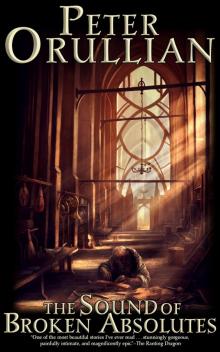 The Sound of Broken Absolutes
The Sound of Broken Absolutes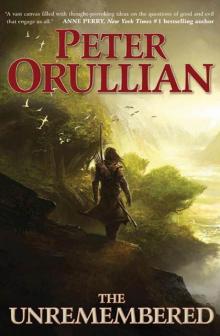 The Unremembered: Book One of The Vault of Heaven
The Unremembered: Book One of The Vault of Heaven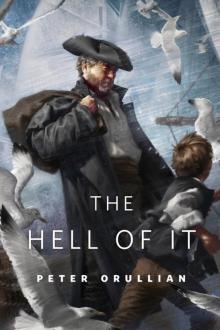 The Hell of It
The Hell of It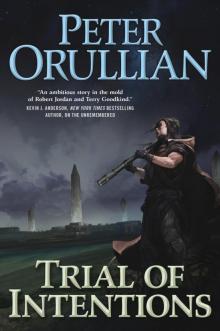 Trial of Intentions
Trial of Intentions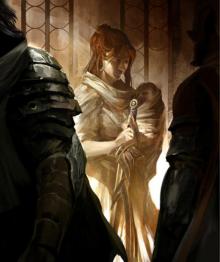 The Great Defense of Layosah
The Great Defense of Layosah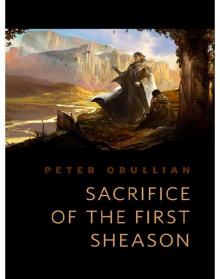 Sacrifice of the First Sheason
Sacrifice of the First Sheason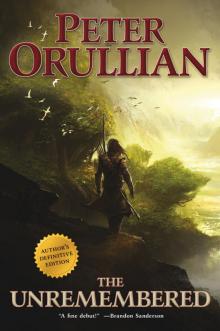 The Unremembered
The Unremembered